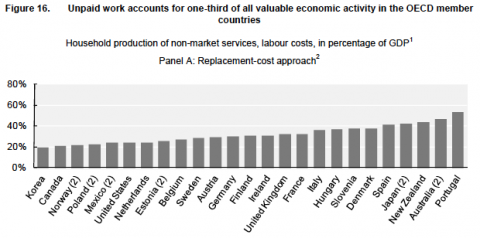A while back I put together a rough calc estimating what our country’s “home-work” is worth as a share of GDP, based on the idea that such work is production, and that it has every bit as much value to our lives as work that we get paid for.
By that estimate (based on the BLS American Time Use Survey), adding the value of home work performed at the median wage would increase our measured GDP by 33%.
It turns out that that estimate was pretty good. Nancy Folbre points to an article in this month’s Survey of Current Business (PDF) that comes to quite similar conclusions:
inclusion raises the level of G.D.P. 39 percent in 1965 and 25.7 percent in 2010.
I also surmised that since Europeans work less hours than Americans (we work four more weeks every year than they do), they would have more time for unpaid work, so the contribution of such work to GDP would be higher in EU countries. Following the data trail back from the SCB piece led me to Cooking, Caring and Volunteering: Unpaid Work Around the World by Veerle Miranda, based on the Multinational Time Use Study. We find therein:

With the exception of Norway (where total GDP is greatly reliant on oil revenues), the European countries do indeed range well up the scale from the U.S.
As I said in that previous post:
If you truly believe in family values, those are some numbers worth pondering.
Cross-posted at Angry Bear.
Comments
8 responses to “Home Work, GDP, and Family Values: It’s Nice to be Validated”
You’re getting started on a slippery slope here. There are all manner of goods that aren’t included in GDP. The value of a breath of fresh air, the smile of a loved one, a hot summer’s afternoon spent reading a book on the beach…
GDP measures that portion of our lives which benefits directly from market exchange. No more.
Oh, and I responded to your earlier post on GDP.
This may interest you though: http://conversableeconomist.blogspot.com.au/2012/05/household-production-levels-and-trends.html
@Saturos “slippery slope”
Definitely true. Even on the more material side, many have pointed out that failure to account for natural-capital depletion seems like a glaring hole in the accounting. Many have proposed what seem to be wise revisions to how GDP is measured and calced. Some changes (i.e. valuating Gross National Love) seem less feasible/useful than others.
Thanks for the Timothy Taylor link. Hadn’t gotten to it yet! He’s really good and I should link to him more. Though this piece just summarizes the study’s summary…
GDP doesn’t reflect true cost, which includes externality, both positive and negative, and it completely ignores the informal economy, which is estimated to be the second largest economy globally (Robert Neuwirth).
Moreover, nominal GDP must be adjusted for inflation for comparison across time, and the truth is that no one really has a clue as to what the actual rate of inflation is, the measurement of inflation being largely subjective.
The result of these and other similar factors is that we proceed blithely onward convinced that our models are accurate representations of reality, whereas they simply reflect a consensus reality that is socially constructed.
While where at it, Arnold Kling’s post here is excellent: http://econlog.econlib.org/archives/2012/06/two_improper_co.html @Asymptosis
@Saturos
The obsession with quantification leads to ignoring the informal economy globally, the estimated production of which is around 10T. The measure used for estimation may be debatable, but the substantial significance of the informal economy is not.
[…] the comments on my recent Home Work, GDP, and Family Values, which discusses a recent study (PDF) on the subject, Saturos points to this Arnold Kling […]
[…] 5, 2012 by admin In the comments on my recent Home Work, GDP, and Family Values, which discusses a recent study (PDF) on the subject, Saturos points to this Arnold Kling post […]